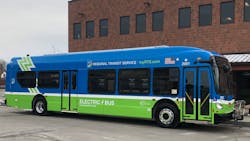Rochester RTS celebrates first of 10 electric buses
The Rochester, N.Y., Regional Transit Service (RTS) celebrated the first of 10 electric buses in its bus fleet at a press conference Oct. 7.
RTS CEO Bill Carpenter was joined by New York State Department of Transportation Commissioner Marie Therese Dominguez, New York State Senator and Senate Transportation Committee Chairman Tim Kennedy (D-63), New York State Assembly Member and Assembly Transportation Committee Member Harry Bronson (D-Rochester), Rochester Mayor Lovely Warren, Rebecca Hughes from New York Power Authority (NYPA), project partners, RTS employees and community stakeholders for the celebration.
The electric bus project at RTS started in the spring of 2017 when New York Gov. Andrew Cuomo announced grant funding for five electric buses and charging equipment. What followed was funding for five more buses, and more than three and a half years of planning, infrastructure analysis, construction, education and training. The first three battery electric buses went into service on Sept. 14. The next three went into service on Oct. 5 and RTS plans to put the next four into service in early November.
“Under Gov. Cuomo’s leadership, New York State continues to make smart, sustainable investments in our transportation systems that will result in a reduced carbon footprint across the Empire State benefiting generations to come,” said New York State Department of Transportation Commissioner Marie Therese Dominguez. “DOT is excited to lead the way in addressing our changing climate and supporting the electrification of public transit systems here in Rochester and across the state.”
During his State of the State address earlier this year, Gov. Cuomo announced that RTS and four other transit systems in the state are required to have 25 percent of their respective bus fleets electric by 2025 and 100-percent zero emission by 2035. RTS implemented a two-phase process for reaching the 2025 goal. Phase one includes the addition of 20 electric buses and charging infrastructure. This event marks the completion of the first half of this phase. RTS anticipates the completion of phase one by the end of 2021. Phase two will involve the construction of a new charging depot capable of housing and charging another 60 electric buses. At the completion of phase two in 2025, we estimate the RTS bus fleet will be 36% electric, putting RTS ahead of Gov. Cuomo’s goal of 25 percent. Having these infrastructure upgrades in place by 2025 is necessary to successfully meet the 2035 goal.
“The future of public transit technology has arrived in the Finger Lakes region and I am grateful to be working with such a talented team of employees, supporters and partners to put RTS on the leading edge of this effort,” RTS CEO Bill Carpenter said. “Because of the work we have done and what we learned over the past three years, we are well positioned to meet Gov. Cuomo’s goals for 2025 and 2035. I thank him for his leadership and support.”
RTS says the success of this project is due to the support of its government partners, and the hard work of the RTS employees and partners on the project team. RTS says it thanks Gov. Cuomo and his team, the New York State Department of Transportation, the New York State Department of Environmental Conservation, the New York State Research and Development Authority, and the Federal Transit Administration for their support and assistance during this project. The following is the list of project partners and their roles in the project.
The New York Power Authority provided funding for four of the chargers and contracted with Billitier Electric and EV Connect to install them.
The New York State Research and Development Authority supported the funding mechanism for the buses.
Black & Veatch helped RTS evaluate and identify infrastructure needs and design the electrical infrastructure.
Billitier Electric installed the electrical infrastructure.
Rochester Gas & Electric provided the final connection to the power supply.
New Flyer of America manufactured the battery electric buses[MW1] .
Project cost and anticipated cost savings
The 10 battery electric buses cost $8.75 million ($875,000 per bus), the charging equipment cost $640,000 ($64,000 per charger) and the electrical infrastructure upgrades cost $2.2 million, contributing to a total project cost of $12.4 million. It costs approximately $400,000 up front for a battery electric bus, but the savings from fuel costs (electricity) and maintenance result in savings of $187,000 over the life of a bus.
The cost of the buses and charging equipment were financed through the following sources:
$7.0 million administered by the New York State Department of Transportation.
$2.3 million administered by the New York State Department of Environmental Conservation and implemented by NYSERDA and NYPA.
$1.7 million provided by the Rochester-Genesee Regional Transportation Authority.
$1.0 million from the Federal Transit Administration.
Environmental impact
Replacing one diesel bus with one electric bus reduces Green House Gas (GHG) emissions by 90.5 metric tons per year, says RTS. This means that the replacement of 10 diesel buses with these 10 electric buses will reduce GHG by 905 metric tons per year. In other words, taking 10 diesel buses off the road is the same as taking 197 personal vehicles off the road.
“This project is a true win for taxpayers and the community, and I thank everyone involved for making it possible,” added Carpenter. “By adding electric buses, we are embracing the future of transit, reducing costs for taxpayers, improving the environment, and making sure we can continue providing safe, reliable mobility for our customers.”
[MW1]Link to previous coverage:
https://www.masstransitmag.com/bus/vehicles/hybrid-hydrogen-electric-vehicles/press-release/21122392/new-flyer-rochester-rts-expands-zeroemission-mobility-with-xcelsior-charge-buses-from-new-flyer
